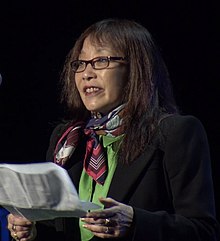Michiko Kakutani
Michiko Kakutani (born January 9, 1955 in New Haven , Connecticut ) is an American publicist and literary critic . As the main reviewer of the New York Times , she was one of the most influential, but also most controversial, literary critics in the United States until 2017.
Kakutani was born in 1955 as the daughter of the Japanese-American mathematician Shizuo Kakutani . She studied English literature and language at Yale University and started working as a journalist for the Washington Post after completing her BA in 1976 , then moved to TIME Magazine and finally to the New York Times in 1979 . In 1983 she moved from the news to the literary department and since then has earned herself a reputation as the most feared literary critic in the country with numerous pangs ; In 1988 she won the Pulitzer Prize in the Critique category. Kakutani is very closed about her private life and avoids public events; only a few photos of her are circulating in the press and on the Internet. Her seclusion and her feared criticism have meanwhile mean that her name is also a household name in popular culture; The protagonist Carrie Bradshaw published a book in an episode of Sex and the City and then waited in awe for Kakutani's criticism.
Kakutani is said to have an extremely rigid critical attitude; a book is usually either panned by her or praised in the highest tones; Overtones are rare. Over the years it has made numerous enemies among American writers, but also among literary critics from other newspapers. She has a particularly deep hateful relationship with Philip Roth , Norman Mailer and Tom Wolfe . Roth caricatured her in the character of the Dean Kimiko Kakizaki ( "the Japanese viper" ) in his novel Sabbaths Theater . Salman Rushdie once described Kakutani as a "strange woman who seems to alternately have an urgent need to praise someone and spank someone" . Mailer drew attention to himself in 2005 with statements that were often criticized as racist in an interview with Rolling Stone ; he called Kakutani a "one-woman kamikaze bomber " and claimed that the NYT only hired her as an "alibias" and was unable to fire her today out of sheer fear of Kakutani.
At the end of July 2017, Kakutani announced that she was giving up her work as a literary critic and that she wanted to "concentrate on" longer pieces about politics and culture "in the future. Her book The Death of Truth: Notes on Falsehood in the Age of Trump was published by Tim Duggan Books in July 2018, and the German translation by Klett-Cotta almost a year later . According to critic Pieke Biermann , the book only takes Trump as a starting point, but is an insightful background analysis of how “truth and reason became endangered species” in the USA.
Works
- The Death of Truth: Thoughts on the Culture of Lies , From the American by Sebastian Vogel (original: The Death of Truth. Notes on Falsehood in the Age of Trump), Klett-Cotta 2019, 197 pp., ISBN 978-3-608 -96403-5 .
Web links
- Reviews by Michiko Kakutani in the New York Times
- Ben Yagoda: Michiko Kakutani: A Critic with a Fixation . In: Slate , April 10, 2006.
Individual evidence
- ^ The 1998 Pulitzer Prize Winner in Criticism , pulitzer.org, accessed May 11, 2019
- ^ Claudia Roth Pierpont: Roth Unbound . Farrar, Strauss and Giroux, New York 2013, ISBN 978-0-374-28051-2 , p. 202.
- ^ "New York Times" book critic retires , deutschlandfunkkultur.de, July 28, 2017, accessed on July 28, 2017
- ↑ Jessica Zack: Book critic Michiko Kakutani takes on Trump in 'The Death of Truth' , review in the San Francisco Chronicle on July 17, 2018, accessed May 11, 2019
- ↑ Pieke Biermann: Michiko Kakutani: "The death of truth" "The executioner of literary criticism" , review for Deutschlandfunk Kultur, published and accessed May 11, 2019
| personal data | |
|---|---|
| SURNAME | Kakutani, Michiko |
| BRIEF DESCRIPTION | American publicist and literary critic |
| DATE OF BIRTH | January 9, 1955 |
| PLACE OF BIRTH | New Haven , Connecticut |
